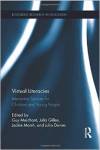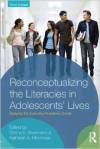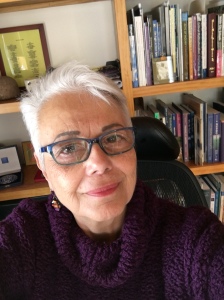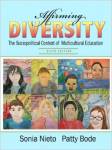Welcome to Global Conversations in Literacy Research (GCLR)
Global Conversations in Literacy Research (GCLR) is a series of interactive open access web seminars that feature cutting-edge literacy research conducted by international literacy researchers. GCLR is grounded in critical literacy, and sees as its mission to use networked technologies to connect global audiences in a virtual space that allows participants to exchange ideas on literacy theory, research, and practice. Each year, GCLR features scholars whose work addresses a range of literacy areas of interest to international audiences. GCLR is sponsored, in part, by the National Writing Project. We are proud to say that, to date, we have provided live professional development to over 6000 global audience members, and archived seminars on the GCLR YouTube Channel have been viewed over 28,000 views. This website has recorded over 80,000 views across six continents and 161 countries. We see these numbers as an indicator that GCLR has introduced a significant shift in how professional development can be delivered with impact across audiences and geographic spaces. Please schedule the 2015-2016 series of seminars into your calendar, add them to your syllabi, share them with organizations interested in literacy, tweet this information to your followers, post on your Facebook pages, and share with others interested in global literacy issues. As a critical literacy project, we invite you to take our GCLR survey after viewing web seminars. Your responses will help us understand the significance of this project, and how we might better serve the global audiences through these web seminars.
Social Media: Like us on Facebook for updates on our web seminar series. Subscribeto the GCLR website to receive emails regarding web seminars and speakers. Follow us on Twitter: #GCLR_GSU. Professional Development Hours: If your district requires professional development hours, GCLR will provide teachers with a letter of attendance.
Thank you to all who participated in the live open-access seminars presented in 2015-2016 (see below). We appreciate your support for this critical literacy project, and hope you find these talks important to your professional lives. If you missed any of the seminars, please access them at the GCLR YouTube Channel.
Past Seminars 2015-2016
September 13, 2015: Rahat Naqvi, Werklund School of Education, University of Calgary, Canada. “The Evolving Face of Literacy: What Role can Languages Play in Mainstream Classrooms?”
Dr. Rahat Naqvi is an Associate Professor in Second Language Pedagogy at the Faculty of Education, University of Calgary. She holds an M.A, an M.Phil and a PhD in the Didactics of Languages and Cultures from the Universite de la Sorbonne, Paris, France. She has taught in various international settings that include the Institut National des Languages et des Civilizations Orientales, Paris, France and most recently at the University of Hamburg, Hamburg, Germany. In this seminar, Dr. Naqvi will discuss questions: Does linguistic diversity have a place in mainstream literacy programs? Isn’t it better to teach any language solely through that language? Shouldn’t English only be used to teach English? Shouldn’t Spanish only be used when teaching Spanish? For many years this was the assumption. And this assumption has been the basis of many bilingual education constructs and ESL programs. New language practices have emerge in interrelationship with old language practices (Cummins, 2011, Koda & Zehler, 2008.) Thus, literacy programs, as well as ESL programs, are creating opportunities for students to use their entire linguistic repertoire to develop bilingualism and metalinguistic awareness, which enriches the academic uses of language in school. In this talk, Dr. Naqvi will provide examples of practice that demonstrate how the benefits of bilingualism/multilingualism can be realised in the classroom. In addition, she will discuss what advantages might multilingual pedagogies offer the monolingual students who sit alongside bilingual peers in linguistically diverse classes.
Dr. Naqvi has served as the Associate Director of the La nguage Research Center at the University of Calgary from 2010 to 2012. Dr. Naqvi is author of a number of books and articles including Thinking about and Enacting Curriculum in “Frames of War” and Framing Peace: Thinking about and Enacting Curriculum as «Radical Hope». Dr. Naqvi’s research has been involved with school
nguage Research Center at the University of Calgary from 2010 to 2012. Dr. Naqvi is author of a number of books and articles including Thinking about and Enacting Curriculum in “Frames of War” and Framing Peace: Thinking about and Enacting Curriculum as «Radical Hope». Dr. Naqvi’s research has been involved with school
October 18, 2015: Guy Merchant, Sheffield Hallam University, United Kingdom. “New Mobile Literacies”; 11:00 a.m. USA/New York time zone
Dr. Merchant is a professor of literacy in education, Research Excellence Framework (REF) co-ordinator and research lead for the Department of Teacher Education. He specializes in research into digital literacy and is particularly interested in the inter-relations between children and young people, new technology and literacy. Dr. Merchant’s seminar will address the role of new mobile devices such as smartphones and tablets in everyday and educational settings. Mobile devices have rapidly infiltrated all walks of life. They are used by administrators, scholars and students, but also in everyday life in the home, in restaurants, and in a wide range of retail, service and tourist industries. There is a pressing need to understand the mobile literacies associated with such devices and their take up in different contexts. Educational literacy practices have fallen under the sway of devices like the iPad, which appeals to educators because of its size, portability and intuitive touch-screen interface (Merchant, 2015). This widespread availability of portable digital devices, and their increasing use within educational settings, suggests a need to re-draw maps of literacy development to account for emerging forms of semiotic representation and patterns of interaction – the new mobile literacies of the 21st Century.
Dr. Merchant is research convenor for the United Kingdom Literacy Association and a member of the association’s Executive Committee and National Council. He has been a core-group member of number of Economic and Social Research Council-funded seminar series and recently co-directed ‘Children and Young People’s Digital Literacies in Virtual Online Spaces’. Dr. Merchant is the author and/or editor of numerous books and articles and books including New Literacies across the Globe, Virtual literacies: interactive spaces for children and young people, and Web 2.0 for Schools: Social Participation and Learning. He is a founding editor of the Journal of Early Childhood Literacy, a member of the Editorial Board of Literacy, and serves on the Student Dissertation Committee of the International Reading Association. He is also active in literacy education and professional work, including writing curriculum materials and professional publications. Dr. Merchant blogs about subjects related to literacy, technology and education. Visit his academic blog athttp://myvedana.blogspot.com
number of Economic and Social Research Council-funded seminar series and recently co-directed ‘Children and Young People’s Digital Literacies in Virtual Online Spaces’. Dr. Merchant is the author and/or editor of numerous books and articles and books including New Literacies across the Globe, Virtual literacies: interactive spaces for children and young people, and Web 2.0 for Schools: Social Participation and Learning. He is a founding editor of the Journal of Early Childhood Literacy, a member of the Editorial Board of Literacy, and serves on the Student Dissertation Committee of the International Reading Association. He is also active in literacy education and professional work, including writing curriculum materials and professional publications. Dr. Merchant blogs about subjects related to literacy, technology and education. Visit his academic blog athttp://myvedana.blogspot.com
November 8, 2015: Dr. Bill Green, Charles Sturt University, New South Wales, Australia. “Literacy in 3D and Beyond?”; 7;00 p.m. USA/Eastern time zone.
Professor Bill Green, emeritus professor in the department of Faculty of Education, from Charles Sturt University, New South Wales, Victoria, Australia. Prof. Green is considered one of the foremost leaders in rural-regional education and literacy studies. Across his career, Professor Green has built relationships between education and cultural studies, and is an international expert in literacy and English teaching. Much of the complexity with which international scholars consider literacy, including information literacy, cultural literacy and media literacy, is derived from Professor Green’s research. Professor Green has been an international leader in creating complex strategies that take into account the important role of cultural geography and its transformative impact on rural education, policy, and teacher education. His goal throughout his career has been to critique the ‘deficit’ model of literacy, and ensure that social justice and equality are part of both public and popular discussions. This commitment includes an engagement with indigenous and environmental education. Professor Green is author of numerous articles and books including Rethinking Rural Literacies and Literacy in 3D the focus of this seminar. His Rethinking Rural Literacies: Transnational Perspectives (2013) troubles the deficit and improvement narratives surrounding concepts of “rural” and “literacy,” and explores how people in many  rural places understand and experience what it means to be rural and the multiple ways that exist of being literate, including ways that are linked to and situated in a particular place and conception of that place. This book theorizes rurality and literacy, and challenge simplistic conceptions of standardized literacy and the real-and-imagined world beyond the metropolis. Literacy in 3D: An Integrated Perspective in Theory and Practice (2012) with Catherine Beavis, and the focus of his seminar, is a collection of essays that draw upon Prof. Green’s influential ‘3D’ model of the cultural, critical, and operational dimensions involved in literacy, pedagogy, and practice. This book explores integrated perspectives that emphasize contemporary literacy dimensions and their interplay. Dr. Green’s seminar will address his
rural places understand and experience what it means to be rural and the multiple ways that exist of being literate, including ways that are linked to and situated in a particular place and conception of that place. This book theorizes rurality and literacy, and challenge simplistic conceptions of standardized literacy and the real-and-imagined world beyond the metropolis. Literacy in 3D: An Integrated Perspective in Theory and Practice (2012) with Catherine Beavis, and the focus of his seminar, is a collection of essays that draw upon Prof. Green’s influential ‘3D’ model of the cultural, critical, and operational dimensions involved in literacy, pedagogy, and practice. This book explores integrated perspectives that emphasize contemporary literacy dimensions and their interplay. Dr. Green’s seminar will address his
literacy 3-D model. Literacy in 3D has three components: cultural, critical, and operational. Literacy, Dr. Green argues, must be approached through both discovery and expression within a cultural context. Critically, students step back, pose questions, synthesize, and hypothesize to understand how language is learned. Finally, the operational part of the model focuses on literacy skills including reading, writing, speaking, and listening. Across the years, Prof. Green’s 3D Model has been featured in a number of publications and policy documents and continues to be relevant and necessary in today’s classrooms.
March 6, 2016: Donna E. Alvermann, University of Georgia, USA, “A Critical Untangling of Adolescents’ Literacy Practices and Popular Culture”, 7:00 p.m. Eastern Time Zone/USA
Dr. Alvermann is the University of Georgia Appointed Distinguished Research Professor of Language and Literacy Education. She also holds an endowed chair position: The Omer Clyde and Elizabeth Parr Aderhold Professor in Education. Formerly a classroom teacher in Texas and New York, her research focuses on young people’s digital literacies and use of popular media. Dr. Alvermann’s seminar will address how popular culture is not a discourse distinct from other discourses, including adolescents’ literacy practices. Much as some accounts would have us believe that the two are unique and divide roughly along informal and formal learning, Dr. Alvermann’s research over the past twenty years or so would suggest just the opposite. In this webinar, Dr. Alvermann will critically reframe key findings from several of her earlier research projects involving adolescents’ literacy practices and popular culture for the express purpose of inviting a discussion focused on the uncertainties and complexities that went unnoticed (or at least unremarked) the first time around.
Dr. Alvermann focuses her research middle-grades through high school students’ comprehension and production in digital environments (including social media). One of her particular interests is in understanding how online learning tools, such as “PersuadeMe” mediate young people’s motivation and engagement in both informational and literary texts. Further, the intersections of informal learning and pop culture figure prominently in Dr. Alvermann’s professional life. She has been invited by the organizers of the 2016 SxSW festival in Austin, Texas to be a member of the mentor panel. Her speciality is: “Developing critical awareness of the need for connected learning opportunities that unite popular culture and literacy instruction, including personalized action plans for following through on that awareness. Author of numerous articles, Dr. Alvermann has several books to her credit: Reconceptualizing the Literacies in Adolescents’ Lives (3rd ed.); Adolescents’ Online Literacies: Connecting Classrooms, Digital Media, and Popular Culture; Content Area Reading and Literacy; and Bring It to Class: Unpacking Pop Culture in Literacy Learning. Among the many awards Dr. Alvermann has received are election into the Reading Hall of Fame, Computers in Research Award (ILA), Oscar Causey Award for Outstanding Contributions to Reading Research. Dr. Alvermann has recently helped to design an interactive website to learn how a community of researchers and researched objects can push boundaries associated with creating and disseminating “original” work and remixes online using a Creative Commons license (http://www.becoming3lectric.com). Please access Dr. Alvermann’s website athttps://coe.uga.edu/directory/profiles/dalverma
school students’ comprehension and production in digital environments (including social media). One of her particular interests is in understanding how online learning tools, such as “PersuadeMe” mediate young people’s motivation and engagement in both informational and literary texts. Further, the intersections of informal learning and pop culture figure prominently in Dr. Alvermann’s professional life. She has been invited by the organizers of the 2016 SxSW festival in Austin, Texas to be a member of the mentor panel. Her speciality is: “Developing critical awareness of the need for connected learning opportunities that unite popular culture and literacy instruction, including personalized action plans for following through on that awareness. Author of numerous articles, Dr. Alvermann has several books to her credit: Reconceptualizing the Literacies in Adolescents’ Lives (3rd ed.); Adolescents’ Online Literacies: Connecting Classrooms, Digital Media, and Popular Culture; Content Area Reading and Literacy; and Bring It to Class: Unpacking Pop Culture in Literacy Learning. Among the many awards Dr. Alvermann has received are election into the Reading Hall of Fame, Computers in Research Award (ILA), Oscar Causey Award for Outstanding Contributions to Reading Research. Dr. Alvermann has recently helped to design an interactive website to learn how a community of researchers and researched objects can push boundaries associated with creating and disseminating “original” work and remixes online using a Creative Commons license (http://www.becoming3lectric.com). Please access Dr. Alvermann’s website athttps://coe.uga.edu/directory/profiles/dalverma
April 17, 2016: Dr. Sonia Nieto, University of Massachusetts, Amherst, USA; “Language, Literacy, and Diversity: The Imperative for All Teachers to Address Culture, Race, and Other Differences”; 7:00 p.m. Eastern Time/USA

Dr. Sonia Nieto, University of Massachusetts, USA
Dr. Sonia Nieto is Professor Emerita of Language, Literacy, and Culture, School of Education, University of Massachusetts, Amherst, USA. Dr. Nieto’s research interests include teacher preparation, multiculturalism, the education of Latinos, and other culturally and linguistically diverse student populations. Dr. Nieto has published widely in such journals as Harvard Education Review, Educational Leadership, and Journal of Educational Change, as well as numerous chapters. Dr. Nieto’s seminar will make the case that all teachers, whether they teach ESL, language, literacy, mathematics, social studies, or anything else, need to address issues of difference with their students. Given the growing diversity of the student body in the United States and around the world, as well as classroom and school conflicts based on racism and other forms of discrimination, it is imperative that all teachers learn about and incorporate curriculum and discussions about these issues in their pedagogy. Based on Dr. Nieto’s research with classroom teachers over many years, she will make the case theoretically as well as in practical examples from courageous teachers who insist on confronting issues of social justice in their curriculum and pedagogy as a way to better prepare their students to live critically, productively, and peacefully in multicultural and multiracial societies.
Dr. Sonia Nieto has devoted her professional life to questions of diversity, equity, and social justice in education. A native of Brooklyn, New York, she began her teaching career in 1966 in an intermediate school in Brooklyn, moving two years later to P.S. 25 in the Bronx, the first fully bilingual school in the Northeast. Her first position in higher education was as Instructor in the Department of Puerto Rican Studies at Brooklyn College where she taught courses in bilingual education for preservice and practicing teachers. Moving to Massachusetts with her family to pursue doctoral studies in education at the University of Massachusetts, Amherst, she received her degree in 1979 with specializations in curriculum, multicultural education, and bilingual education. After working for the Massachusetts Department of Education for a year, she accepted a faculty position at her alma mater where she remained for 25 years, retiring as a full professor.
Professor Nieto’s research focuses on multicultural education, teacher education, and the education of students of culturally and linguistically diverse backgrounds, topics on which she continues to write and speak. She has written or edited eleven books including the best-selling Affirming Diversity: The Sociopolitical Context of Multicultural Education, a textbook widely used in teacher education programs around the nation and beyond. The first edition of Affirming Diversity (1992) was selected by the Museum of Education as one of the books that helped define the field of education in the 20th century, and it was featured in a 2015 online exhibit. She has also published dozens of journal articles and book chapters. Her memoir, Brooklyn Dreams: My Life in Public Education, will be published by the Harvard Education Press in 2015. Other books include The Light in Their Eyes: Creating Multicultural Learning Communities (1999, 2010), Language, Culture, and Teaching (2002, 2010), What Keeps Teachers Going? (2003), Finding Joy in Teaching Students of Diverse Backgrounds (2013), and four edited volumes, Puerto Rican Students in U.S. Schools (2000), Why We Teach (2005), Dear Paulo: Letters From Those Who Dare Teach (2008), and Why We Teach Now (2015).
best-selling Affirming Diversity: The Sociopolitical Context of Multicultural Education, a textbook widely used in teacher education programs around the nation and beyond. The first edition of Affirming Diversity (1992) was selected by the Museum of Education as one of the books that helped define the field of education in the 20th century, and it was featured in a 2015 online exhibit. She has also published dozens of journal articles and book chapters. Her memoir, Brooklyn Dreams: My Life in Public Education, will be published by the Harvard Education Press in 2015. Other books include The Light in Their Eyes: Creating Multicultural Learning Communities (1999, 2010), Language, Culture, and Teaching (2002, 2010), What Keeps Teachers Going? (2003), Finding Joy in Teaching Students of Diverse Backgrounds (2013), and four edited volumes, Puerto Rican Students in U.S. Schools (2000), Why We Teach (2005), Dear Paulo: Letters From Those Who Dare Teach (2008), and Why We Teach Now (2015).
Dr. Nieto has received numerous awards for her scholarly work, teaching, and advocacy, including six honorary doctorates. In 1998, she was awarded an Annenberg Institute Senior Fellowship in Urban Education and in 2000, a residency at the Rockefeller Foundation’s Bellagio Center in Italy. In 2008, she received the Social Justice in Education Award from the American Educational Research Association (AERA), the premier professional organization for education researchers, and has also been elected as a Fellow of AERA. In addition, she was elected as a Laureate of Kappa Delta Pi honorary educational organization, a distinction limited to 60 living educators. She has been a Visiting Scholar at universities in the United States, Puerto Rico, and Spain and in 2012 she served as the Wits-Claude Distinguished Scholar at the University of Witwatersrand in Johannesburg, South Africa. Dr. Nieto received the Medal of Distinguished Service, the highest honor given by Teachers College, Columbia University, in 2014. She was recently invited as an honoree for “Inside the Academy,” an online archive that recognizes the most influential scholars in education through their personal and professional histories. In addition, in 2015, she was elected as a member of the National Academy of Education.
Sonia Nieto is married to Angel Nieto, a poet, children’s book author, and former middle and high school teacher. They have three daughters and 12 grandchildren.













